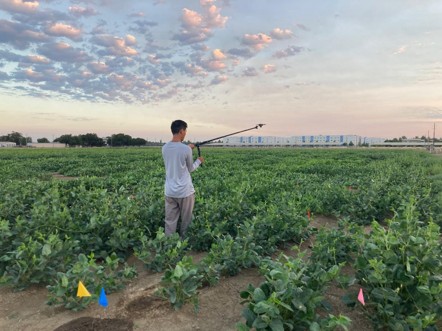Q & A with Kaz Uyehara
GEMINI Team Spotlight
Quick Summary
- Learn more about the GEMINI team in our series of team member spotlights
Now let's meet Kaz Uyehara, another postdoctoral researcher working with both the AI-Enabled Sensing and the 3D Biophysical Modeling teams.
Please introduce yourself: who are you, where are you from, and what is your educational/professional background?
KU: Hi, my name is Kaz Uyehara. I was born and raised in West Philadelphia, got my bachelor's degree in Biology and Environmental Studies at Swarthmore College, took a break to be a high school science, computer science, and math teacher, and then did my PhD in Ecology and Evolutionary Biology at Princeton University. After that, I led the Collective Behavior of Plants project at the Centre for the Advanced Study of Collective Behavior in Germany. My background is in theoretical ecology, plant ecology, and plant physiology, but my passion is centered around the intersection of plant ecology, self-organization, and game theory.

What is your role within GEMINI?
KU: I am part of the AI-Enabled Sensing and 3D Biophysical Modeling teams, while also working in the field collecting data. My focus has been creating a high throughput phenotyping pipeline for plant phenological traits and yield that is grounded with empirical data.
How did you end up working with GEMINI and what interests you most about this project?
KU: I moved to Davis with my wife and started working on GEMINI after hearing about the project from Dr. Bailey. I am really interested in uniting mathematical and computational techniques with good, old fashioned, muddy boots plant science. In our case, I think computer vision and plant modeling can be used to complement, rather than replace, breeders walking through their fields and observing their plants. I am developing tools that will allow us to prevent some back and knee pain when in the field, while also unlocking new traits that we would not be able to measure using traditional techniques. My number one goal is to see these techniques translate into real breeding successes!
Is there anything particularly exciting you are working on now or in the near future that you would like to share?
KU: I am excited to be finalizing a flower detection model that will allow us to capture flowering dynamics in cowpea and a phenology model that has been able to predict peak flowering time and yield in cowpea — all of which use only an iPhone for data collection.
What do you like to do outside of work (personal hobbies and interests)?
KU: When I am not in the field or the office, I am spending time with my wife and our 9-month-old daughter. Since becoming a father, my only hobbies have been changing diapers, giving piggyback rides, and dreaming about cowpeas.
